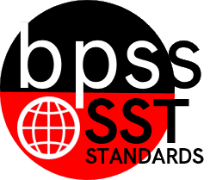6th Grade Standards
| Civics |
SST-06.C.01
6th Grade (SST) Social Studies
Civics Standard
SST-06.C.01 Explain the historical and philosophical foundations of government.Benchmarks
Guiding Practice
The guiding topics for each benchmark includes various subject matter that can be used to help students reach the standard. Calculation Method for StandardsStandards are larger groups of related benchmarks. So the Standard is a calculation of all the related benchmarks. So click on the benchmark identifier below each Standards to access the learning targets and proficiency scales for each standard. | |
SST-06.C.01.1
6th Grade (SST) Civics Domain: SST-06.C.01.1 Evaluate the thoughts of major political philosophers.Guiding Topics: Cicero, Socrates, Plato, Aristotle, Iroquois Confederation, Locke, Hobbes, Montesquieu, Rousseau, Marx, Natural Rights Philosophy, Classical Republicanism Student Learning Targets:Knowledge Targets
Reasoning Targets
Skills (Performance) Targets
Product Targets
Proficiency ScaleThe Student can ...1 Beginning... with help, demonstrate a partial understanding of some of the simpler details and processes (Score 2.0 content) and some of the more complex ideas and processes (Score 3.0 content).
2 Developing... demonstrate no major errors or omissions regarding the simpler details and processes but exhibits major errors or omissions regarding the more complex ideas and processes (Score 3.0 content).
3 Proficient“The Standard.”... demonstrate no major errors or omissions regarding any of the information and processes that were end of instruction expectations.
4 Advanced... demonstrate in-depth inferences and applications regarding more complex material that go beyond end of instruction expectations.
ResourcesVocabulary
Websites
| |
SST-06.C.01.2
6th Grade (SST) Civics Domain: SST-06.C.01.2 Explain the influence of British and colonial history on early United States.Guiding Topics: Magna Carta, English Bill of Rights, Petition of Right, Mayflower Compact, formation of colonial governments, deterioration of relations with Great Britain Student Learning Targets:Knowledge Targets
Reasoning Targets
Skills (Performance) Targets
Product Targets
Proficiency ScaleThe Student can ...1 Beginning... with help, demonstrate a partial understanding of some of the simpler details and processes (Score 2.0 content) and some of the more complex ideas and processes (Score 3.0 content).
2 Developing... demonstrate no major errors or omissions regarding the simpler details and processes but exhibits major errors or omissions regarding the more complex ideas and processes (Score 3.0 content).
3 Proficient“The Standard.”... demonstrate no major errors or omissions regarding any of the information and processes that were end of instruction expectations.
4 Advanced... demonstrate in-depth inferences and applications regarding more complex material that go beyond end of instruction expectations.
ResourcesVocabulary
Websites
| |
SST-06.C.01.3
6th Grade (SST) Civics Domain: SST-06.C.01.3 Evaluate the creation and impact of primary sources on political thought in the United States.Guiding Topics: Magna Carta, English Bill of Rights, Petition of Right, Mayflower Compact, Declaration of Independence, Articles of Confederation, Federalist Papers, AntiFederalist Papers, Virginia and New Jersey Plans, the Great Compromise, Constitution, the Bill of Rights Student Learning Targets:Knowledge Targets
Reasoning Targets
Skills (Performance) Targets
Product Targets
Proficiency ScaleThe Student can ...1 Beginning... with help, demonstrate a partial understanding of some of the simpler details and processes (Score 2.0 content) and some of the more complex ideas and processes (Score 3.0 content).
2 Developing... demonstrate no major errors or omissions regarding the simpler details and processes but exhibits major errors or omissions regarding the more complex ideas and processes (Score 3.0 content).
3 Proficient“The Standard.”... demonstrate no major errors or omissions regarding any of the information and processes that were end of instruction expectations.
4 Advanced... demonstrate in-depth inferences and applications regarding more complex material that go beyond end of instruction expectations.
ResourcesVocabulary
Websites
| |
SST-06.C.02
6th Grade (SST) Social Studies
Civics Standard
SST-06.C.02 Analyze the structures and functions of governments.Benchmarks
Guiding Practice
The guiding topics for each benchmark includes various subject matter that can be used to help students reach the standard. Calculation Method for StandardsStandards are larger groups of related benchmarks. So the Standard is a calculation of all the related benchmarks. So click on the benchmark identifier below each Standards to access the learning targets and proficiency scales for each standard. | |
SST-06.C.02.1
6th Grade (SST) Civics Domain: SST-06.C.02.1 Differentiate/compare forms and origins of governments.Guiding Topics: Democracy, monarchy, oligarchy, tyranny, fascism, communism, theocracy, constitutional republic, parliamentary democracy, presidential democracy, and other forms of governments Student Learning Targets:Knowledge Targets
Reasoning Targets
Skills (Performance) Targets
Product Targets
Proficiency ScaleThe Student can ...1 Beginning... with help, demonstrate a partial understanding of some of the simpler details and processes (Score 2.0 content) and some of the more complex ideas and processes (Score 3.0 content).
2 Developing... demonstrate no major errors or omissions regarding the simpler details and processes but exhibits major errors or omissions regarding the more complex ideas and processes (Score 3.0 content).
3 Proficient“The Standard.”... demonstrate no major errors or omissions regarding any of the information and processes that were end of instruction expectations.
4 Advanced... demonstrate in-depth inferences and applications regarding more complex material that go beyond end of instruction expectations.
ResourcesVocabulary
Websites
| |
SST-06.C.02.2
6th Grade (SST) Civics Domain: SST-06.C.02.2 Examine the role and purposes of government.Guiding Topics: Purpose of founding governments in River Valley, Asian, Greek, Roman, African, Mesoamerican civilizations and the purpose of current government systems (i.e., to maintain law and order, authority, legitimacy, sovereignty) Student Learning Targets:Knowledge Targets
Reasoning Targets
Skills (Performance) Targets
Product Targets
Proficiency ScaleThe Student can ...1 Beginning... with help, demonstrate a partial understanding of some of the simpler details and processes (Score 2.0 content) and some of the more complex ideas and processes (Score 3.0 content).
2 Developing... demonstrate no major errors or omissions regarding the simpler details and processes but exhibits major errors or omissions regarding the more complex ideas and processes (Score 3.0 content).
3 Proficient“The Standard.”... demonstrate no major errors or omissions regarding any of the information and processes that were end of instruction expectations.
4 Advanced... demonstrate in-depth inferences and applications regarding more complex material that go beyond end of instruction expectations.
ResourcesVocabulary
Websites
| |
SST-06.C.02.3
6th Grade (SST) Civics Domain: SST-06.C.02.3 Analyze the structure, principles, and interpretation of the Constitution of the United States.Guiding Topics: Preamble, articles, amendments, separation of powers, checks and balances, power of the purse, impeachment, advise and consent, veto power, judicial review, bicameralism, etc. Student Learning Targets:Knowledge Targets
Reasoning Targets
Skills (Performance) Targets
Product Targets
Proficiency ScaleThe Student can ...1 Beginning... with help, demonstrate a partial understanding of some of the simpler details and processes (Score 2.0 content) and some of the more complex ideas and processes (Score 3.0 content).
2 Developing... demonstrate no major errors or omissions regarding the simpler details and processes but exhibits major errors or omissions regarding the more complex ideas and processes (Score 3.0 content).
3 Proficient“The Standard.”... demonstrate no major errors or omissions regarding any of the information and processes that were end of instruction expectations.
4 Advanced... demonstrate in-depth inferences and applications regarding more complex material that go beyond end of instruction expectations.
ResourcesVocabulary
Websites
| |
SST-06.C.02.4
6th Grade (SST) Civics Domain: SST-06.C.02.4 Explain the relationship among federal, state, tribal, and local governmental powers.Guiding Topics: Necessary and proper clause, the commerce clause,
Tenth Amendment, enumerated powers vs. reserved powers, amendment process, separation of powers, revenue sources, coining money, treaty powers, interstate commerce, treaty rights and tribal sovereignty, etc. Student Learning Targets:Knowledge Targets
Reasoning Targets
Skills (Performance) Targets
Product Targets
Proficiency ScaleThe Student can ...1 Beginning... with help, demonstrate a partial understanding of some of the simpler details and processes (Score 2.0 content) and some of the more complex ideas and processes (Score 3.0 content).
2 Developing... demonstrate no major errors or omissions regarding the simpler details and processes but exhibits major errors or omissions regarding the more complex ideas and processes (Score 3.0 content).
3 Proficient“The Standard.”... demonstrate no major errors or omissions regarding any of the information and processes that were end of instruction expectations.
4 Advanced... demonstrate in-depth inferences and applications regarding more complex material that go beyond end of instruction expectations.
ResourcesVocabulary
Websites
| |


